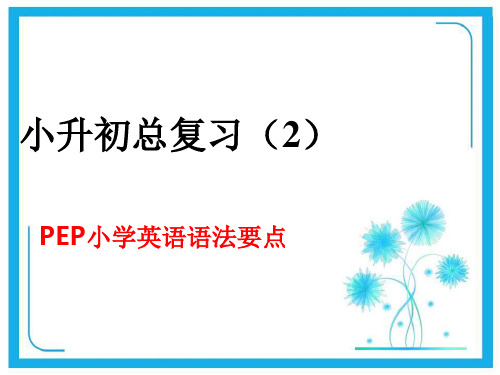小升初英语语法总结-PPT-讲解与练习
合集下载
pep英语六年级小升初总复习语法要点课件.ppt

小升初总复习(2)
PEP小学英语语法要点
一、 一般现在时:
1.表示事物或人物的特征、状态。
如:The sky is blue.天空是蓝色的。 He is a boy 他是个男孩 she has long hair .她有长头发
2.表示经常性或习惯性的动作。如:I get up at six every day.我每天六 点起床。一般的时间词有:often , sometimes ,everyday ,usually
动词加ing的变化规则
1.一般情况下,直接加ing,如:cookcooking 2.以不发音的e结尾,去e加ing,如:makemaking, taste-tasting take-taking
3.如果末尾是一个元音字母和一个辅音字母, 双写末尾的辅音字母,再加ing,如:runrunning, stop-stopping swimswimming
⑶带有was或were的句子,其否定、疑问的变 化和is, am, are一样,即否定句在was或were 后加not,一般疑问句把was或were调到句首。 3.句中没有be动词的一般过去时的句子
否定句:didn’t +动词原形,如:Jim didn’t go home yesterday.
一般疑问句:在句首加did,句子中的动词过 去式变回原形。如:Did Jim go home yesterday?
三、否定句:在be动词(am, is, are)l后加 not或情态动词will后加not成won’t。
一般过去时 1.一般过去时表示过去某个时间发生的动作或 存在的状态,常和表示过去的时间状语连用。一 般过去时也表示过去经常或反复发生的动作感谢。 如: yesterday ,last( weekend ,month ,year…) be used to 2.Be动词在一般过去时中的变化: ⑴am 和is在一般过去时中变为was。(was not=wasn’t) ⑵are在一般过去时中变为 were。(were not=weren’t)
PEP小学英语语法要点
一、 一般现在时:
1.表示事物或人物的特征、状态。
如:The sky is blue.天空是蓝色的。 He is a boy 他是个男孩 she has long hair .她有长头发
2.表示经常性或习惯性的动作。如:I get up at six every day.我每天六 点起床。一般的时间词有:often , sometimes ,everyday ,usually
动词加ing的变化规则
1.一般情况下,直接加ing,如:cookcooking 2.以不发音的e结尾,去e加ing,如:makemaking, taste-tasting take-taking
3.如果末尾是一个元音字母和一个辅音字母, 双写末尾的辅音字母,再加ing,如:runrunning, stop-stopping swimswimming
⑶带有was或were的句子,其否定、疑问的变 化和is, am, are一样,即否定句在was或were 后加not,一般疑问句把was或were调到句首。 3.句中没有be动词的一般过去时的句子
否定句:didn’t +动词原形,如:Jim didn’t go home yesterday.
一般疑问句:在句首加did,句子中的动词过 去式变回原形。如:Did Jim go home yesterday?
三、否定句:在be动词(am, is, are)l后加 not或情态动词will后加not成won’t。
一般过去时 1.一般过去时表示过去某个时间发生的动作或 存在的状态,常和表示过去的时间状语连用。一 般过去时也表示过去经常或反复发生的动作感谢。 如: yesterday ,last( weekend ,month ,year…) be used to 2.Be动词在一般过去时中的变化: ⑴am 和is在一般过去时中变为was。(was not=wasn’t) ⑵are在一般过去时中变为 were。(were not=weren’t)
小升初英语总复习 语法要点课件(通用)

apples are there in the bag?
There are 5.
(6) How is the fish?
It’s 2kg.
四、根据答句写出问句
(1)
I’m 160 cm.
(2)
I’m 12 years old.
(3)
My shoes are 80
yuan.
(4)
Amy’s hair is 30 cm
当主语为第三人称单数时,要用doesn‘t构成 否定句。 如:He doesn't often play. 一般疑问句: Do( Does ) +主语+动词原形+其它。如:-
Do you often play football?- Yes, I do. /
No, I don't. 当主语为第三人称单数时,要用does构成一般 疑问句。 如:- Does she go to work by bike?- Yes, she does. / No, she doesn't.特殊疑问句: 疑问词+一般疑问句。如:How does your father go to work?
形容词比较级复习 1、形容词比较级在句子中的运 用:两个事物或人的比较用比 较级,比较级后面一般带有单 词than。比较级前面可以用 more, a little 来修饰表示程 度。than后的人称代词用主格 (口语中可用宾格)。
2.形容词加er的规则:⑴一般在词尾加 er ;short-shorter small-smaller ⑵ 以字母e 结尾,加r ;fine-finer late-
动词加ing的变化规则
1.一般情况下,直接加ing,如:cookcooking 2.以不发音的e结尾,去e加ing,如:makemaking, taste-tasting take-taking
小升初语法复习PPT课件

小升初英语语法
3.of +名词所有格 of +名词所有称为双重所有格,使用时要注意以下几项。 1)表示部分时,前面的词一定要有a ,an ,some ,any ,few ,two ,no , several (几个)之类有修饰语,不能是one和the 。 如可说:a book of my brother's 我兄弟的一本书 不说:books of my brother's或 book of my brother's . 2)当带有感情色彩时,可用the ,this ,that ,these ,those于名词前。 如the pretty daughter of your sister's 你姐姐的漂亮的女儿 did you read that book of lu xun's ? 你读过鲁迅的那本书吗? 3)of 前面的名词不能是专有名词。 如不说:this is john of his uncle's. 4)of 后面的名词必须是特定的。 如these books of my friend's are good 我朋友的这些书很好。 5)of 后面的名词必须是指人的名词。 比较不说it is a leaf of the tree's. a picture of my father指的是爸爸本人的照片。 注意of 所有格和双重所有格有时可以交替使用,意义无甚区别。 如a friend of my brother→a friend of my brother's 测试点a car of betty's cars ,不可换为a car of betty.。jim's and tom's fathers are in the same office now.吉姆的父亲的汤姆父亲 目前在同一办公室
小学英语语法总结-PPT-讲解与练习

please take these books to __h_im_____(他). 8. __T_h_e_y___(他们) found __it_____(它) difficult to learn German.
tomorrow ____w_e___(我们) are going in __t_h_e_ir_s___(他们的). 5. ____I____(我) lend ____m_y____(我的) books gladly to _______
(我的my) friends and to ________(你的yo)u. rs 6. Can you help ___m__e____(我) with __m_y_____(我的) English. 7. When __y_o_u____(你) go to see ___y_o_u_r ___(你的) father,
小学英语语法总复习汇总
分类
• 一、名词(可数名词和不可数名词) • 二、人称代词 • 三、冠词 • 四、动词 • 五、介词 • 六、数词 • 七、形容词和副词
• 八、there be结构 • 九、句式 • 1.肯定句 • 2.否定句 • 3.疑问句 • 4.祈使句 • 十、时态: • 1. 一般现在时 • 2. 一般过去时 • 3. 现在进行时 • 4. 一般将来时 • 十一、“wh”的特殊疑问句
二、人称代词和物主代
人称
主格
第一人称
I
第二人称 you
第三人称 She/he/it
复数
ห้องสมุดไป่ตู้
we
宾格 me you him us
复数 形容词性物主代词 名词性物主代词
We
My
Mine
You
tomorrow ____w_e___(我们) are going in __t_h_e_ir_s___(他们的). 5. ____I____(我) lend ____m_y____(我的) books gladly to _______
(我的my) friends and to ________(你的yo)u. rs 6. Can you help ___m__e____(我) with __m_y_____(我的) English. 7. When __y_o_u____(你) go to see ___y_o_u_r ___(你的) father,
小学英语语法总复习汇总
分类
• 一、名词(可数名词和不可数名词) • 二、人称代词 • 三、冠词 • 四、动词 • 五、介词 • 六、数词 • 七、形容词和副词
• 八、there be结构 • 九、句式 • 1.肯定句 • 2.否定句 • 3.疑问句 • 4.祈使句 • 十、时态: • 1. 一般现在时 • 2. 一般过去时 • 3. 现在进行时 • 4. 一般将来时 • 十一、“wh”的特殊疑问句
二、人称代词和物主代
人称
主格
第一人称
I
第二人称 you
第三人称 She/he/it
复数
ห้องสมุดไป่ตู้
we
宾格 me you him us
复数 形容词性物主代词 名词性物主代词
We
My
Mine
You
人教PEP版小升初英语《知识点归纳总复习》精品教学课件PPT优秀课件106页

are 5. There ________ many kinds of animals in the zoo.
was 6. What ________ the date yesterday?
is 7. Look! A little girl ________ flying a kite.
was 8. Who ________ not at school last Monday?
are 2. My father and I ________ going to Beijing next month.
Were 3. ________ you on duty the day before yesterday?
was 4. Mr. King ________ in London two weeks ago.
以a -cso结us尾in的of单h数e人rs等称等名。词末尾加’s waitress-waitress’s
不cIThsh规inlad’则ttres的Fnirl’复lsayn数kun人acl称fer名ioefn词dT末oomf尾’sy加ohu’arsss?told
me
the
childrensame
以Jo-kse结f尾iv的e 复tim数e人s.称名词末尾加’
2. 表示“说话的人刚刚提到过的人或事物”。 There is a boat in the river. The boat is made of wood.
3. 用在后面跟有限定性介词短语的名词前。 the letter from America, the fourteenth of April
4. 用在泛指的乐器名词前。 He plays the piano.
girls-girls’
小学小升初英语语法总复习(整理版)精品PPT课件

4. We go to school every morning.(改为否定 句) ______________________________________
改错(划出错误的地方,将正确的写在横线上) 1. Is your brother speak English?
__________________ 2. Does he likes going fishing?
your father going to do with you this afternoon.
3、问什么时候。When.例如:She’s going to go to
bed at nine. →When is she going to bed?
六、同义句:be going to = will I am going to go swimming tomorrow(明天). = I will go swimming tomorrow.
如:He is not a worker.他不是工人。
一般疑问句:Be 主语 其它。讲义共享 如:-Are you a student? -Yes. I am. / No, I'm not.
特殊疑问句:疑问词 一般疑问句。 如:Where is my bike?
2.行为动词的变化。 否定句:主语 don’t( doesn’t ) 动词原形( 其它)。
句型转换: 1. They are doing housework .(分别改成一
般疑问句和否定句) _________________________________ _________________________________
2.The students are cleaning the classroo m . ( 改一般疑问句并作肯定和否定回答) _________________________________ _________________________________
改错(划出错误的地方,将正确的写在横线上) 1. Is your brother speak English?
__________________ 2. Does he likes going fishing?
your father going to do with you this afternoon.
3、问什么时候。When.例如:She’s going to go to
bed at nine. →When is she going to bed?
六、同义句:be going to = will I am going to go swimming tomorrow(明天). = I will go swimming tomorrow.
如:He is not a worker.他不是工人。
一般疑问句:Be 主语 其它。讲义共享 如:-Are you a student? -Yes. I am. / No, I'm not.
特殊疑问句:疑问词 一般疑问句。 如:Where is my bike?
2.行为动词的变化。 否定句:主语 don’t( doesn’t ) 动词原形( 其它)。
句型转换: 1. They are doing housework .(分别改成一
般疑问句和否定句) _________________________________ _________________________________
2.The students are cleaning the classroo m . ( 改一般疑问句并作肯定和否定回答) _________________________________ _________________________________
小升初语法总复习课件

一、形容词的比较级 1.形容词比较级在句子中的运用:两个事物或人的比较用比较级, 比较级后面一般带有单词than。比较 级前面可以用more, a little 来修饰表示程度。than后的人称代 词用主格(口语中可用宾格)。 2.形容词加er的规则:一般在词尾加er ;以字母e 结尾,加r ; 3.以一个元音字母和一个辅音字母结尾,应双写末尾的辅音字母, 再加er ; “辅音字母+y”结尾,先把y变i,再加er 。
主格
宾格
me , us you him , her It them
2.人称代词
第一人称 第二人称 第三人称
I , we you he, she , it ,they
3.形容词性物主代词
主格: I you she he it his they its we their our
形容词性物主代词:
My your her
study—studies
D.以“f或fe”结尾变f或fe为v,再加-es knife-knives
E.不规则名词复数man-men woman-women policeman-policemen policewoman-policewomen mouse-mice foot-feet child-children fish-fish Chinese-Chinese
6. Mary’s hair is as __________(long) as Lucy’s. 7.Ben ______ (jump) ________ (high) than some of the boys in his class. 8.________ Nancy sing __________ (well) than Helen? Yes, she _____. 9.Fangfang is not as _________ (tall) as the other girls.
主格
宾格
me , us you him , her It them
2.人称代词
第一人称 第二人称 第三人称
I , we you he, she , it ,they
3.形容词性物主代词
主格: I you she he it his they its we their our
形容词性物主代词:
My your her
study—studies
D.以“f或fe”结尾变f或fe为v,再加-es knife-knives
E.不规则名词复数man-men woman-women policeman-policemen policewoman-policewomen mouse-mice foot-feet child-children fish-fish Chinese-Chinese
6. Mary’s hair is as __________(long) as Lucy’s. 7.Ben ______ (jump) ________ (high) than some of the boys in his class. 8.________ Nancy sing __________ (well) than Helen? Yes, she _____. 9.Fangfang is not as _________ (tall) as the other girls.
- 1、下载文档前请自行甄别文档内容的完整性,平台不提供额外的编辑、内容补充、找答案等附加服务。
- 2、"仅部分预览"的文档,不可在线预览部分如存在完整性等问题,可反馈申请退款(可完整预览的文档不适用该条件!)。
- 3、如文档侵犯您的权益,请联系客服反馈,我们会尽快为您处理(人工客服工作时间:9:00-18:30)。
词
)
名词,有单、复数形式;
物质名词和抽象名词通常无法用数目计算,称为不可数 名词,一般只有一种形式。
小学英语
英语语法中,只有可数名词才有复数 形式。名词有两种数的形式:
1)单数(表示一个人或事物); 2)复数(表示多于一个的人或数)。
可数名词
不可数名词
名词的数:cfihshic(ke鱼n (,鸡一,种一动种物动)物)
句
小学英语
一、名词
名
专有名词
特定的人、地方、机构等专有的名称。第一个字母通常要大 写。 e.g. Jim Green, New York, Bank of China,Peking
词
University 星期、月份、节日、学科、报刊名也是专有名词。
(
表 示
普通名词 个体名词—— 表示某类人或东西中的个体,如:student , desk
小升初语法总复习汇总
分类
小学英语
• 一、名词(可数名词和 不可数名词)
• 二、人称代词 • 三、冠词 • 四、动词 • 五、介词 • 六、数词 • 七、形容词和副词
• 八、there be结构 • 九、句式 • 1.肯定句 • 2.否定句 • 3.疑问句 • 4.祈使句 • 十、时态: • 1. 一般现在时 • 2. 一般过去时 • 3. 现在进行时 • 4. 一般将来时 • 十一、“wh”的特殊疑问
tomorrow ____w_e___(我们) are going in __t_h_e_ir_s___(他们的). 5. ____I____(我) lend ____m_y____(我的) books gladly to _______
(我的my) friends and to ________(你的yo)u. rs 6. Can you help ___m__e____(我) with __m_y_____(我的) English. 7. When __y_o_u____(你) go to see ___y_o_u_r ___(你的) father,
小学英语
Practise
1. ___H__e__(他) is my brother. 2. I had a letter from __h_e_r______ (她). 3. It’s all right; it’s only __m__e_____(我). 4. Today ___w_e____(我们) went in ___ou_r_____(我们的) car;
chicken(鸡肉) fish(鱼肉)
an ice cream(一个冰淇淋) ice cream(冰淇淋这一类) a tomato salad(一种西红 salad(沙拉这一类) 柿沙拉)
名词复数形式的构成
小学英语
形式
变化规则
发音
例词
一般情况
+s
1. 清辅音结尾的名词后[s] 2. 浊辅音结尾的名词后[z]; 3. 元音结尾的名词后[z];
13. judge __j_u_d_g_e_s ____ 14. map ___m_a_ps______
小学英语
二、人称代词和物主代
人称
主格
第一人称 I
第二人称 you
第三人称 She/he/i
t
复数
we
宾格
me you
him
us
复数
We You
形容词性物主代 词
名词性物主代词
My
Mine
Your
books, cups, cats dogs, birds, arms days, players
以-s,-sh, -ch, -x, +es
[iz]
-z结尾的名词
大多数以-o结 +es
[z]
尾的有生命名
词
bus, brush, boxes, watch,
tomatoes, potatoes,heroes
以o结尾的无生 +s
[z]
命名词
radios, pianos,photos
以辅音字母加y 把y改成i再 [z] 结尾的名词 加es
stories, families, babies
以f和fe结尾 把f或fe改 [z] 的大多数名词 成v再加es
thieves, knives, wives
不规则名词的复数
小学英语
小学英语
Practise
1. peach__p_e_ac_h_e_s__
2. zoo _z_o_o_s_____
3. glass _g_l_as_s_e_s___
4. fox _f_o_x_e_s__
5. lady __la_d_i_es____
6. policewoman p_o_l_ic_e_w_o_m_e_n
yours
They Her/his/its Hers/his/its
\
our
ours
主格一般用在句子前面,宾格用在动词后面,I am Li Le. Call me le le.
形容词性物主代词指 “某人的什么”,my book (我的书), your puppy. (你的小狗)
名词性人称代词指什么是“某人的”This book is mine. (这本书是我的)
1. 由元音字母的变化构成: man-men, tooth-teeth, foot-feet,
mouse-mice, woman-women 2. 有些名词的复数形式与单数的形式一样:
sheep, deer, fish(但也可以是fishes) 3. 有些名词变成复数时加-en:
child-children, ox-oxen
人
集体名词—— 表示若干个体组成的集合体,如:class , family
和 事
物质名词—— 表示无法分为个体的物质名称,如:water , rice , s,状态,品质等抽象名称,如:love ,carelessness
名
称
的
个体名词和集体名词多数可以用数目来计算,称为可数
7. house ___h_o_u_s_e_s___ 8. photo __p_h_o_to_s___
9. monkey _m__on_k_e_y_s___ 10. wife ___w_iv_e_s____
11. rose ___r_o_s_es______ 12. path _____pa_t_h_s__
please take these books to __h_im_____(他). 8. __T_h_e_y___(他们) found __it_____(它) difficult to learn German.
